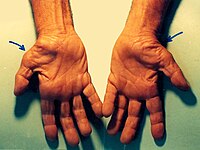
Photo from wikipedia
BACKGROUND AND IMPORTANCE Acute bilateral brachial plexus injury is rare and usually a result of traction injury. Immediate operative intervention is reserved for rare cases of ongoing compression of the… Click to show full abstract
BACKGROUND AND IMPORTANCE Acute bilateral brachial plexus injury is rare and usually a result of traction injury. Immediate operative intervention is reserved for rare cases of ongoing compression of the plexus; the role for acute decompression of the brachial plexus secondary to compartment syndrome has not been previously described. In this report, we describe the technique and role for urgent brachial plexus decompression. CLINICAL PRESENTATION A 32-yr-old man presented with acute complete bilateral brachial plexus palsy due to focal rhabdomyolysis and brachial plexus compression after a night of excess alcohol and methadone ingestion. He had complete loss of motor and sensory function from C5 to T1, with the exception of partial sensory sparing of the C5 dermatome. Magnetic resonance imaging demonstrated diffuse muscular edema of the supraclavicular and infraclavicular fossae in addition to the pectoralis muscles and the deltoids bilaterally. He underwent urgent surgical decompression of his supraclavicular and infraclavicular fossae with fasciotomies of the pectoral muscles and the anterior deltoids, allowing direct visualization and decompression of the entire brachial plexus resulting in a near-complete functional recovery. CONCLUSION Neurosurgeons should include brachial plexus compression due to compartment syndrome in the differential diagnosis of patients with acute upper extremity weakness, particularly when associated with prolonged immobilization and/or substance abuse. Prompt surgical decompression should be performed in these patients if imaging and laboratory data suggest compartment syndrome and resultant neurological deficit.
Journal Title: Operative neurosurgery
Year Published: 2018
Link to full text (if available)
Share on Social Media: Sign Up to like & get
recommendations!